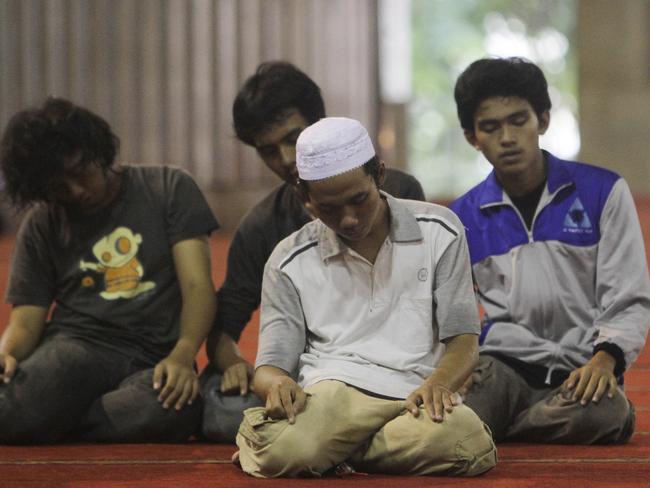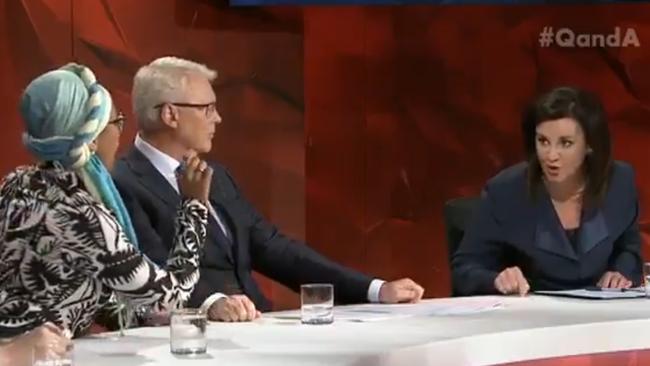This is what sharia law actually is
MUSLIM activist Yassmin Abdel-Magied asked Senator Jacqui Lambie whether she knew what sharia law was. Here’s the answer.
TV
Don't miss out on the headlines from TV. Followed categories will be added to My News.
WHEN Muslim activist Yassmin Abdel-Magied confronted Jacqui Lambie over her support of Donald Trump on Q&A last night, she accused the senator of talking about stuff she didn’t know about, so was she right?
A heated on-air confrontation between the two happened after Ms Lambie said Australia should “follow Donald Trump’s example by deporting all Muslims who support sharia law”.
But Ms Abdel-Magied broke in, asking her whether she knew what sharia law was.
She pointed out that Islam was as simple as “me praying five times a day”.
But the Tasmanian senator replied: “What about rights for women? You can’t be a sharia law supporter and be half pregnant at the same time.”
So who is right?
WHAT IS SHARIA LAW?
Well, apparently calling it sharia law already indicates you don’t know what it is, Western Sydney University lecturer Jan Ali told news.com.au.
“Sharia is Islamic law,” Dr Ali said. So the term sharia law is actually a tautology, like saying “I’m reversing the car back”.
In Arabic, sharia actually means “a path to a watering place”.
It originated from the language of the Arabian people who lived in the desert where water is limited.
“They need to move towards water in a straight way, and as quickly as possible, they didn’t want to waste time getting to the water,” Dr Ali said.
“Water denotes a lifeline, without water you don’t have life ... it’s an absolute necessity.”
For Muslims, Dr Ali said sharia would guide them the right way and lead them to happiness, harmony, peace, satisfaction, a good life in this world and ultimately a perfect life in the hereafter.
OK, SO WHAT DOES IT INVOLVE?
Sharia is a collection of written texts that governs every single aspect of life.
“From inheritance to burial ceremony, to marriage, to guiding and looking after orphans,” Dr Ali said.
Essentially sharia is the law that governs the religion of Islam but it is much broader than that because it includes social, economic, cultural and political issues.
Sharia is also broken up into two forms: Koranic and Islamic law.
Dr Ali, a senior lecturer of Islam and Modernity, said the Koran had direct instructions about certain situations, including for example inheritance laws. It says that a man should get double the amount of assets the female does.
But in situations that the Koran doesn’t cover, people use Islamic law. In Sunni Islam this has five sources:
1. Koran
2. Hadith
3. Qiyas (analogical deduction)
4. Ijma (scholarly consensus)
5. Ijtihad (individual or scholarly reasoning).
“You can go to one of the sources, or all of these sources,” Dr Ali said.
“There is no country in the world that actually completely depends on sharia,” he said.
“That’s why we don’t have Islamic countries, we have Muslim countries.”

An Islamic country is one that is completely founded by sharia.
Even Saudi Arabia, which is where Mecca is located and where the Prophet Muhammad was born, sharia is not being followed totally.
“There is no monarchy in Islam so I don’t know how Saudi Arabia could justify monarchism,” Dr Ali said.
In countries like Malaysia, there is a dual legal system where customary law is parallel to sharia.
Citizens can chose to have disputes ruled on by a civil court or a sharia court, and the result will be accepted by the other.
“Different countries take different approaches,” Dr Ali said.
WHERE DO THE AMPUTATIONS COME IN?
Many people may have heard stories about amputations, stoning, child marriages, female genital mutilation and women not being able to drive.
While the Koran does have rules on some of these, Dr Ali said whether these were adopted as law, depended on each country’s interpretation of the text.
“Some scholars or individuals might take a literal understanding, some might take a more liberal approach,” he said.
There is a lot of debate around what these interpretations are, and one subject Australians may be familiar with, is the debate around whether women can chose to wear the veil and whether they wear a hijab covering just the hair, or a full burqa covering the face.
KEEPING SHARIA OUT OF AUSTRALIA
Ms Lambie may want to deport all Muslims who support sharia law but Dr Ali has bad news for her.
“If Muslims are living somewhere and they are governed by sharia, obviously there will be sharia in that country,” he said.
“So of course there is sharia in Australia because there are Muslims here.
“If you say you want Muslims here but not sharia, it’s like saying you want the body but not the head.”
Dr Ali said even something as simple as how to walk, talk, read or eat is governed by sharia.
“Praying five times a day is one thing dictated by sharia,” he said.
While some laws may be different to Australian law, this does not mean they are incompatible.

For example, while the Koran does talk about amputations for those caught thieving, Dr Ali said sharia was flexible and could be applied differently in each country.
“That’s not to say there cannot be an alternative punishment, I think that's what people don’t understand,” he said.
“If people don’t want to have their hands chopped off, well sharia is happy to imprison them.”
Dr Ali said if there was a conflict between Australian laws and sharia, then Australia’s laws would prevail.
“Sharia also allows men to have up to four wives but if Australia says ‘sorry mate you can only have one’, sharia says ‘no problem, we’ll have one’,” Dr Ali said.
But he said people could try and change laws, just like someone who wanted marijuana legalised did.
“In a free society like Australia, you can try and get it approved, but if you can’t, then tough luck,” Dr Ali said.
“A man can try his luck but if he can’t get four wives, he’ll have to bear with one wife and hope she keeps him in line.”
Dr Ali said sharia was often misunderstood by Australians but also by Muslims.
“With all due respect to Jacqui Lambie, I don’t think she’s alone, even many Muslims don’t know the law itself,” he said.
“They are unaware of the internal complexities, the reality of sharia.
“They need first and foremost to familiarise themselves with the concept and its reality, before embarking on a mission to call for its banning.”
Dr Ali said if sharia was banned, how would Muslims pursue their everyday living?
“What does that say about democracy, about your own society?
“If you take pride in the fact that your society is tolerant, liberal, rational and that your society is compassionate, harmonious and humane, but then treat people intolerantly, irrationally and you want to impinge on their rights, you want to impose on them, that totally demolishes your own secular, belief system doesn’t it?”
Originally published as This is what sharia law actually is


